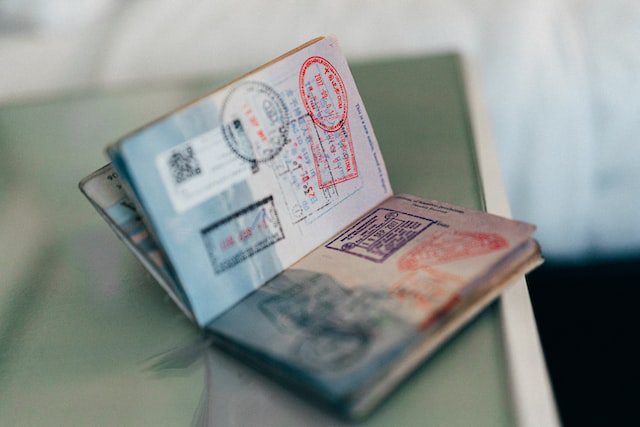
International students may require a financial sponsor when applying for a US student visa. If you intend to study in the United States as an international student, you must apply for a student visa.
However, the application process for your student visa may differ depending on the program you have applied for and the type of sponsorship required for your studies. Your student visa may also depend on the country of your study.
Either way, sponsoring a student visa can greatly help you in the student visa application process in terms of funding. Have you been looking for a student visa sponsorship, but don’t really know how to get started?
This article would serve as a complete guide, showing you how and who can help you with a student visa sponsorship. Let us begin.
What is a student visa sponsorship?
A student visa is a nonimmigrant class visa that allows international students to study at SEVP-certified universities or colleges in the United States. The SEVP is a program administered by the Department of Homeland Security that collects vital information on international students.
The program also provides certification and supervision to accredited institutions, as well as counseling to both institutions and students on the international student visa status and how to maintain eligibility.
When applying for a student visa, you must show that you can cover your tuition and living expenses in the United States. If you can’t cover it, then you need a student visa sponsorship. Grants, family members, government organizations, and private companies are some examples of financial sponsors for students.
You must be accepted by a SEVP-certified US institution before you can apply for a student visa. Once accepted, you need to decide which type of student visa is best for your situation, as each has its own set of conditions and requirements.
What are the different types of student visa sponsorship?
The type of student visa you need is determined by the program you are enrolled in, as well as your tuition sponsorship. These are the two most common types of student visas for international students in the United States:
Student visa for an F-1 student
This is the most common type of student visa and allows you to study at SEVP-approved institutions. The following are the main requirements for F-1 visas:
- Students can work on campus without a work permit but must obtain one in order to work in an off-campus job or internship.
- Dependents of F-1 students cannot work but can enroll in part-time programs of study.
- F-1 graduates may apply for Optional Practical Training (OPT) or Curriculum Practical Training (CPT) to work or train in the United States for up to 12 months after graduation. Graduates of STEM-related degrees may apply for an additional two years.
- If no extensions are granted, F-1 students must leave the United States within 60 days of the completion of their program.
J-1 Student Visa
You can participate in work-study-related exchange programs at US colleges and universities with a J-1 student visa. The institute to which you have applied must be accredited by the US Department of State, Bureau of Educational Affairs.
The following requirements apply to J-1 visas:
- Participate in any work cause (on or off campus) Participate in a work permit.
- Dependents of J-1 students may work and study both part-time and full-time.
- Graduating J-1 students are eligible to apply for Academic Training (AT) opportunities in a field related to their studies.
- If no extensions are granted, J-1 students must return to their home countries within 30 days of the program completion date. Before returning to the United States, the student must also live in their home country for two years.
Can I get a student visa sponsorship?
You certainly can! When you apply for a student visa, you may receive financial aid for your studies from your university or college, the government, or personal sources such as friends or family.
You may be required to provide personal proof of the source sponsoring your student visa. Depending on the sponsor, you may be required to fill out specific forms to disclose the sources of your financial support.
What forms do I need for student visa sponsorship?
You must obtain an I-20 or DS-2019 form depending on your student visa. F-1 visas require the I-20 form, while J-1 visas require the DS-2019 form.
Your I-20 or DS-2019 will be sent to you once your university or college confirms receipt of your payment. J-1 students must work with their program sponsor’s Responsible Official to obtain their DS-2019 form, while F-1 students receive their I-20 from a Designated School Official.
Your I-20 or DS-2019 form contains information critical to your degree, such as the program you intend to study, program start and end dates, funding sponsors, and other personal information you provided when applying. The I-20 or DS-2019 forms are essential because they prove your enrollment in a SEVP-certified institution.
The same information is entered into the Student and Exchange Visitor Information System when your I-20 or DS-2019 (SEVIS) is issued. SEVIS is a SEVP database that stores and maintains information about international students online. You must pay the I-901 SEVIS fee as part of the student visa application process.
Requirements for Student Visa Sponsorship
You must provide evidence of your ability to pay tuition and university fees for at least 12 months as part of your student visa requirements. If your academic program lasts less than a year, let’s say; nine months, you only need to show funds for that time period.
This usually involves bank statements from your sponsor (or from yourself, if you’re paying for your program with your own money). You may also need to provide a list of total assets, depending on the university.
While you are not expected to pay for all years of your program at once, it is critical that you show that you have sufficient funds without having to rely on employment in the United States during your studies.
The type of financial sponsors for students who are eligible to support your program is determined by the student visa you need. You can use personal funds, assets, or property that can be converted to cash, or funds from other people (such as friends and family) or organizations to sponsor an F-1 student visa for an international student. A non-profit or educational sponsor not related to you can only sponsor J-1 visas.
Please note that if family members are sponsoring international students, they must also submit Form I-134, which establishes their consent to finance their studies and living expenses, as well as bank and asset statements.
People seeking funding from non-family members must submit Form I-134 along with a written statement explaining why they are paying for their studies. Both forms are available on the US Citizenship and Immigration Services website.
Who can sponsor an international student?
Many nonprofit organizations, private organizations, and US and international governments can provide financial aid to international students. This kind of help is often hard to come by. Here are some organizations that can provide financial aid to international students seeking an education.
US government funding
It is rare to find government support in the United States. Many financial aid programs, such as Pell Grants, are only available to United States citizens. Some companies may have funds available for students. This could come from the US State Department. Also, the United States Agency for International Development can help.
Some students are able to obtain funds this way. These programs manage the application process for students. They may also have very strict rules regarding the school of choice. You can also restrict how the funds can be used. According to Education USA, qualifying students can get up to 100% of their tuition paid. It may be worth looking into any of these programs for financial help. This is usually a good place to start.
Financing of an international government
Some students may obtain funds from the government of their country of origin. This varies considerably. Some countries may contribute to the cost of studying abroad for their citizens. This can be done for practice.
Sometimes it is done to encourage students to pursue further education. They may also provide it if they do not have a program that corresponds to the interests of the student.
If these programs are available, a country’s Department of Education usually offers them. A Ministry of Education may also occasionally provide it. They can assist in forming partnerships with schools in the United States.
These collaborations have the potential to be extremely profitable. If these connections exist, students may be eligible for significant funding. This could cause education to be provided free of charge or at a reduced cost.
Sponsorship for International Students from Private Organizations
Private organizations are another source of sponsorship for international students. Many companies may be looking for international students to fill key positions. They can also provide them with scholarships. They tend to want to promote international relations. Some organizations may wish to open new channels for untapped talent. Private companies may do this for a variety of reasons, including potential employers.
Companies will often do this if they have linked their interests to a country’s objectives or economy. They may also set very strict guidelines for this. Before selecting this option, students must know the objectives of the company. They may have very specific goals for the student once they have completed their course of study. Missions and values must align with student goals.
These private organizations usually establish the ground rules on the origin of these funds. It also specifies how the funds will be used. Conditions can sometimes bind a student to a private organization for years. They can influence many aspects of the student experience.
Some organizations may cover all of the student’s expenses, whether they are a part-time or full-time student. This includes tuition and book fees. It could also include funds to move to the United States. Some programs may include internships as part of the curriculum. If this is the case, the J1 visa rules still apply.
Sponsorship for international students from non-profit or other organizations
Some nonprofit organizations can help with these expenses. They can provide financial aid to international students who wish to study in the United States. These are usually companies based outside of the United States. Some may do so if they will benefit from better global travel or cultural exchange. Many nonprofit organizations have a specific goal or benefit in mind. These rules must be taught to students.
They must learn about the organization and its goals. Some of these programs may be somewhat restricted. Many people can offer to cover the full cost of a student’s education. Books, fees, and tuition may be included.
Some will even pay your rent. They may even provide a stipend to help with expenses. These organizations can be difficult to locate. Some can be obtained from the education department. Students frequently require a working relationship with the organization. This can open the door for them to receive this type of assistance.
Frequent questions
Parents. Your first port of call should always be your mother or father. Blood relatives can also serve as your sponsor. As a result, the form must include information about how they are related to you. Grandparents, immediate uncles, and aunts on both maternal and paternal sides, as well as cousins, can help.
Just look for organizations that offer student visa sponsorship and keep an eye out for when to apply.
Only the applicant, parent, grandparent, or spouse can act as a sponsor. There are no restrictions on who can sponsor a school applicant.
The person, government, company, or organization is willing and able to financially support the international student. Tuition, books, supplies, fees, and living expenses are covered by financial aid for the duration of the student’s studies at the institution.
Yes, you can be sponsored by a friend. They will be required to complete USCIS paperwork. You must first be accepted into a school and have them provide you with an I-20.
Long story short, students generally need to apply through a program sponsor. These sponsors are usually in charge of selecting those who will participate in the J1 Exchange Visitor Program. They can then provide assistance to the student while in the United States. A person can apply for sponsorship for a J1 visa.
Conclusion
International students who want to study full-time abroad have several options. Many students must pay for their college education themselves. Sponsoring international students could help cover the high costs of higher education.
Many student loan and grant programs in the United States are generally only available to United States citizens. Some may provide opportunities for students, but usually, the government does not. Financial support can come from a variety of sources. The main advantage here is that the sponsor usually covers some or all of the student’s expenses.


















Hi? Please , I need to be sponsored for a master’s degree in Tourism.and Hospitality and helping hand is highly welcomed from Rwanda,
Rwanda offers a range of potential funding opportunities to help students finance their master’s degree in Tourism and Hospitality, including both government-sponsored and private scholarship options.
First off, you should consider applying for the Rwandan Government Scholarship Program (RGSP). The program provides funding for study abroad as well as in Rwanda itself, covering living expenses, tuition fees and travel costs. It is open to citizens of all countries willing to study at any Rwandan higher education institution. To learn more about eligibility requirements or apply for the RGSP, please visit http://www.mifotra.gov.rw/index.php?id=35&linkId=1 .
You may also wish to take advantage of other government-funded programs that are specifically devoted towards helping hospitality industry professionals develop their skills further through postgraduate studies abroad, such as The Human Resource Development Fund (HRDF), which has been established under the Ministry of Education and Culture with financial support from partner institutions like Netherlands’ NUFFIC and USAID/Rwanda’s Higher Education Capacity Building Project (HECBP). To find out more about HRDF’s scholarship opportunities or apply for them directly, visit http://hecbp-hrdfprogrammingrwanda.com/.
In addition to those government-backed programs there are a number of private scholarships available mainly from non-governmental organizations like Rotary International Foundation or The Foundation For International Cooperation In Higher Education Of Africa (FICOHA), Aspire2Be among others that provide financial assistance exclusively based on academic excellence; creative ability; neediness; individual accomplishments etc., so it would be worthwhile researching these options carefully too before making your final decision on where you want to attend university or pursue postgraduate studies in Tourism & Hospitality abroad & home country alike!
Finally remember: always keep an eye out for new opportunities – many organisations launch new grants each year aimed at encouraging & enabling people just like you who have aspirations towards furthering their knowledge & expertise within this field so be sure not miss any chance – good luck!